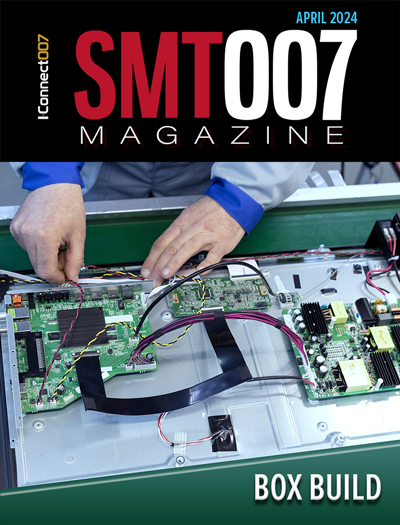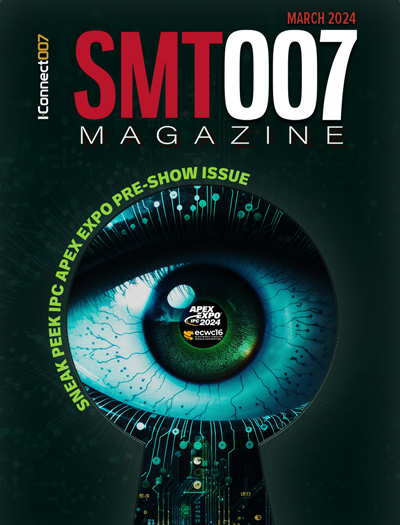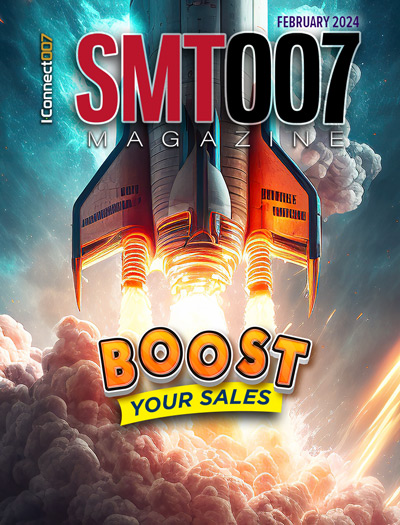-

- News
- Books
Featured Books
- smt007 Magazine
Latest Issues
Current Issue
Box Build
One trend is to add box build and final assembly to your product offering. In this issue, we explore the opportunities and risks of adding system assembly to your service portfolio.

IPC APEX EXPO 2024 Pre-show
This month’s issue devotes its pages to a comprehensive preview of the IPC APEX EXPO 2024 event. Whether your role is technical or business, if you're new-to-the-industry or seasoned veteran, you'll find value throughout this program.

Boost Your Sales
Every part of your business can be evaluated as a process, including your sales funnel. Optimizing your selling process requires a coordinated effort between marketing and sales. In this issue, industry experts in marketing and sales offer their best advice on how to boost your sales efforts.
- Articles
- Columns
Search Console
- Links
- Events
||| MENU - smt007 Magazine
IPC: Lead Added to EU REACH Candidate List of SVHCs
July 13, 2018 | Nicolas Robin, IPC Senior Director, EuropeEstimated reading time: 3 minutes
The European Chemicals Agency (ECHA) added lead metal on its Candidate List of Substances of Very High Concern (SVHCs), on 27 June 2018, owing to its properties as a reprotoxic substance.
What does Candidate Listing mean for IPC Members?
Companies may have legal obligations resulting from the inclusion of lead metal in the Candidate List. Candidate Listing means that EU suppliers of articles containing more than 0.1% by weight of lead – including lead-based batteries, architectural lead sheet, engineered lead products and those manufactured with lead containing alloys – must provide information to the recipients which allows for safe use.
Note that in the case of complex objects (i.e. objects made up of more than one article joined or assembled together), the 0.1% threshold applies to each article. As a minimum, the information provided by the article supplier must contain the name of the substance, if present above the 0.1% threshold. The information must be provided in writing and free of charge.
There is also a requirement to notify ECHA. This notification must be submitted by the importer/producer no later than six months after the substance was included in the Candidate List. EU and EEA suppliers of substances on the Candidate List must provide their customers with a safety data sheet (SDS), including relevant exposure scenarios where relevant. Lead producers should already be doing so, but an update is recommended to notify their customers of the inclusion of lead metal in the Candidate list as a Substance of Very High Concern.
The obligation to provide a SDS also applies to mixtures including solders and (pre-fabricated) alloys; however, if the mixture does not meet the criteria for classification as hazardous under CLP, the SDS needs only to be provided at the recipient’s request.
What are the next steps?
The next regulatory step after Candidate Listing is the inclusion of the substances on the so-called Authorization List. Once included on the Authorization List, companies wishing to use the substance will have to apply for application-specific permissions from ECHA.
a) 2019: With lead metal included on the Candidate List in June 2018, it could be included in ECHA’s prioritization exercise in 2019, with a formal recommendation likely to be submitted by ECHA to the European Commission the same year.
b) 2021: If the REACH Committee of Member State representatives agrees to include lead metal in Annex XIV, the Authorization List, the substance could be added as early as 2021; a transitional period would apply, potentially giving rise to a ‘sunset date’ (after which REACH Authorization would be required to use lead metal, unless exemption applied) in 2024.
c) Before 2024: Companies applying for authorization to use lead metal in the EU would need to submit their application at least 18 months before the sunset date to prevent supply chain disruption. Authorization would only be granted if the risks to human health or the environment from the use of metallic lead on its own or in a mixture above the relevant concentration threshold is proven to be adequately controlled or, in the case where adequate control cannot be demonstrated that the financial benefits of continued use outweigh the societal costs of the health and/or environmental impacts and that there are no suitable alternative substances or technologies for the use.
What can IPC and its members do?
IPC will be engaged in an advocacy campaign in partnership with an Eurometaux/ILA cross commodity platform. The goal of this campaign will be to stop the inclusion of lead in the authorization list, or if not possible to advocate for exemptions.
Engage with lead cross commodity platform (September 2018-2019)
1. Map out the use of lead across the industry and assess where the risks areas and potential adverse effects are and in which applications substitutions to lead are possible.
2. If lead metal were to be prioritized for Authorization, a 90-days public consultation will be opened to gather views on transition periods, case studies and examples highlighting where REACH Authorization would lead to regulatory overlap or inconsistency. Data will need to be collected from IPC membership to develop a socio-economic analysis.
Focus efforts on R&D funding for substitution: Both ECHA and the European Commission are very keen on fostering R&D efforts on substitution, for which the EU offers a specific budget line. IPC will assess the possibility to get funding opportunities for research on leadfree electronics and has already initiated preliminary contacts with the European Commission service in charge of R&D.
If you have any questions or comments please contact NicolasRobin@IPC.org.
Suggested Items
Alternative Manufacturing Inc. Awarded QML Requalification to IPC J-STD-001 and IPC-A-610
04/24/2024 | IPCIPC's Validation Services Program has awarded an IPC J-STD-001 and IPC-A-610 Qualified Manufacturers Listing (QML) requalification to Alternative Manufacturing Inc (AMI).
IPC Design Competition Champion Crowned at IPC APEX EXPO 2024
04/24/2024 | IPCAt IPC APEX EXPO 2024 in Anaheim, California, five competitors squared off to determine who was the best of the best at PCB design.
Big Win for Defense Production Act Budget Allocation in FY24 Budget
04/23/2024 | I-Connect007 Editorial TeamOne year ago, President Biden issued a determination that chips and packaging are critical for national security. Since that time, much work has been done to continue the conversation in Washington, elevating the importance of the entire chips value chain, and including printed circuit boards and substrates, without which chips cannot operate.
Real Time with... IPC APEX EXPO 2024: A Conversation with IPC's CEO: New Venue, Sustainability, and More
04/23/2024 | Real Time with...IPC APEX EXPOBarry Matties hosts Dr. John W. Mitchell, CEO of IPC, on the final day of IPC APEX EXPO 2024. They discuss the new venue in Anaheim and broach a range of topics, from traffic and booth experiences to workforce development, sustainability, and the CHIPS Act. And they offer advice for newcomers as IPC looks forward to an even better show experience next year.
Boeing's Janene Stinson Earns IPC Excellence in Education Award at IPC APEX EXPO 2024
04/22/2024 | IPCThe IPC Excellence in Education award was presented to Janene Stinson, Boeing, at IPC APEX EXPO 2024 in Anaheim, California, in recognition of her significant contributions to workforce development and leadership.


